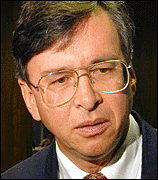

![]()
Gathering Places


![]()
Gathering Places
The environmental future of the Asia-Pacific region is seriously threatened. We're all aware of its burgeoning population that continues to grow and the scarce natural resources that are being consumed and polluted at an alarming rate. The question is how to best find effective solutions. I believe the answers are in the hands of leaders at the local level in each country and island nation. Honolulu readies for
environmental summitIn 1999, I initiated the Mayors' Asia-Pacific Environmental Summit (MAPES). Held at the Hilton Hawaiian Village, 400 representatives from 19 countries and 118 cities came together to discuss the environmental challenges they face. The gathering of municipal leaders, environmental consultants and international dignitaries established of a serious dialogue among key regional and global leaders who affect environmental policy.
On May 4-6, the Mayors' Asia-Pacific Environmental Summit will meet again in Honolulu. More than 400 delegates are coming with the purpose of formulating tangible goals and solutions. Many of the leaders who shared their environmental problems at the previous conference will give progress reports. The summit will culminate with the delegate-drafted Mayors' Action Plan -- a formal report of recommendations to be delivered at the United Nations Earth Summit 2002 on Sustainable Development.
Integral to MAPES's success is focusing on policy changes at the local government level. Also integral is accountability. Attendees at the 1999 MAPES made commitments to plant 100,000 trees, to reduce leaks in the municipal water system by 20 percent, and to convert one city's bus system's fuel source from diesel to electricity. All of these promises are measurable, and each of them can be a catalyst for long-term sustainability.
The success of the first summit prompted attendees to establish Honolulu as a permanent secretariat for Asia-Pacific environmental issues. This places Hawaii in the position to become the leading resource for solutions to environmental issues throughout the world. The city is now establishing the new Asia-Pacific Urban Technology Institute in Kapolei. After it is completed in June, this facility will be a centerpiece for Hawaii's environmental technology resources and expertise.
Hawaii has already acted as a leader in this arena by exporting our environmental expertise. Local firms such as Lyon Associates, Wimberly Allison Tong & Goo and Belt Collins Hawaii have led environmental consulting work in Asia. Our strict environmental permitting process has also served as a template for other regions developing their own processes.
With the establishment of the institute, the hosting of MAPES, and the delivery of the Mayors' Action Plan to the U.N. Earth Summit next year, Hawaii will be on its way to proving itself as a primary source for solutions to environmental problems for local governments from Shanghai to Lihue.
Jeremy Harris is mayor of Honolulu and
an announced candidate for governor in 2002.